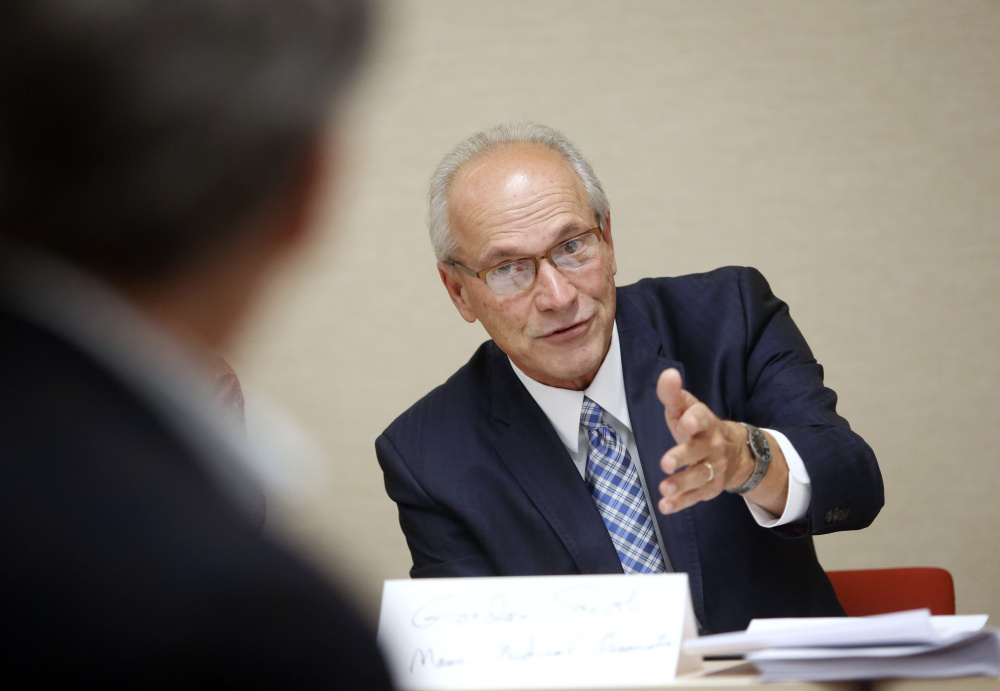MaineCare reforms that have sharply reduced the volume of opioid prescriptions should be expanded throughout the state’s health care system to help combat the heroin addiction crisis, participants in a round-table discussion on the issue agreed Tuesday.
Gordon Smith, executive director of the Maine Medical Association, said the organization would support legislation to expand MaineCare prescribing reforms to all doctors, including those who exclusively serve patients with private insurance.
U.S. Sen. Angus King, who convened the gathering at MaineHealth offices in downtown Portland, said he was struck by the MaineCare program’s success, and would encourage it to be copied as much as possible.
“They have gotten ahold of something that’s working,” King said after the meeting.
The independent senator said he’s not sure if the federal government should get involved in mandates that apply to prescriptions, but he noted that heroin abuse is a national problem.
Preventing people from becoming addicted to prescription opioids is one key to stemming the heroin epidemic, experts say, because four out of five new heroin users start with prescription opiates.
“These are staggering facts,” said Andrew Kiezulas of Portland, a recovering heroin addict who is now an advocate for treatment. He turned to heroin after getting addicted to prescription opioids. “I’m a living example of what can happen.”
MaineCare, the state’s Medicaid program, instituted reforms in 2012 that limit opioid prescriptions to 14 days. Doctors who want to extend or renew the prescriptions must provide medical justification.
That change, among others, led to a 45 percent reduction in the number of opioids prescribed to MaineCare beneficiaries from 2012 to 2014.
Among patients covered by private insurance, opioid prescribing increased by 5 percent in the same time period, and 2015 is on track to surpass last year.
Smith said the Maine Medical Association surveyed its members, and 70 percent were in favor of expanding the MaineCare prescription justification requirement to all insurers, even though that would create more paperwork for all doctors.
“We should do this. The vast majority of the medical community gets it,” Smith said.
Dr. Noah Nesin, chief medical officer of Penobscot Community Health Care in Bangor, said opioids should not be prescribed for chronic pain, but some doctors still do so.
“There’s no evidence that they work for chronic pain, and there’s lots of evidence that they can cause harm,” Nesin said. “There should be an extra threshold to meet before prescribing opioids.”
Dr. Rita Noonan, an official with the U.S. Centers for Disease Control and Prevention who participated in the discussion by conference call, said the agency is working on new prescribing guidelines and trying to help states come up with strategies to combat opioid abuse.
“We’re talking about a public health epidemic,” Noonan said. “What really fuels this epidemic is changes in the way opioids have been prescribed.”
Opioid prescribing for chronic pain took off in the late 1990s and 2000s, and changing the laws and culture to avoid prescribing the painkillers is difficult, health experts said.
Leslie Clark, executive director of the Portland Community Health Center, said far too many doctors don’t realize they shouldn’t be prescribing opioids for chronic pain.
“Three times in the past year I was offered opioids when I went to the doctor. And I wasn’t in particularly great pain, just a little bit of pain. When I said ‘no’ one time, I was offered opioids a second time,” Clark said. “There’s still too much misinformation out there.”
Smith said the state’s prescription monitoring program, which helps doctors track patients who are prescribed opiates and can help identify those who are “doctor shopping,” should be strengthened. He said the data in the program is valuable, and if the state spent more money on it, the information might help identify doctors who are prescribing opioids when they shouldn’t be.
Copy the Story Link
Send questions/comments to the editors.






Success. Please wait for the page to reload. If the page does not reload within 5 seconds, please refresh the page.
Enter your email and password to access comments.
Hi, to comment on stories you must . This profile is in addition to your subscription and website login.
Already have a commenting profile? .
Invalid username/password.
Please check your email to confirm and complete your registration.
Only subscribers are eligible to post comments. Please subscribe or login first for digital access. Here’s why.
Use the form below to reset your password. When you've submitted your account email, we will send an email with a reset code.